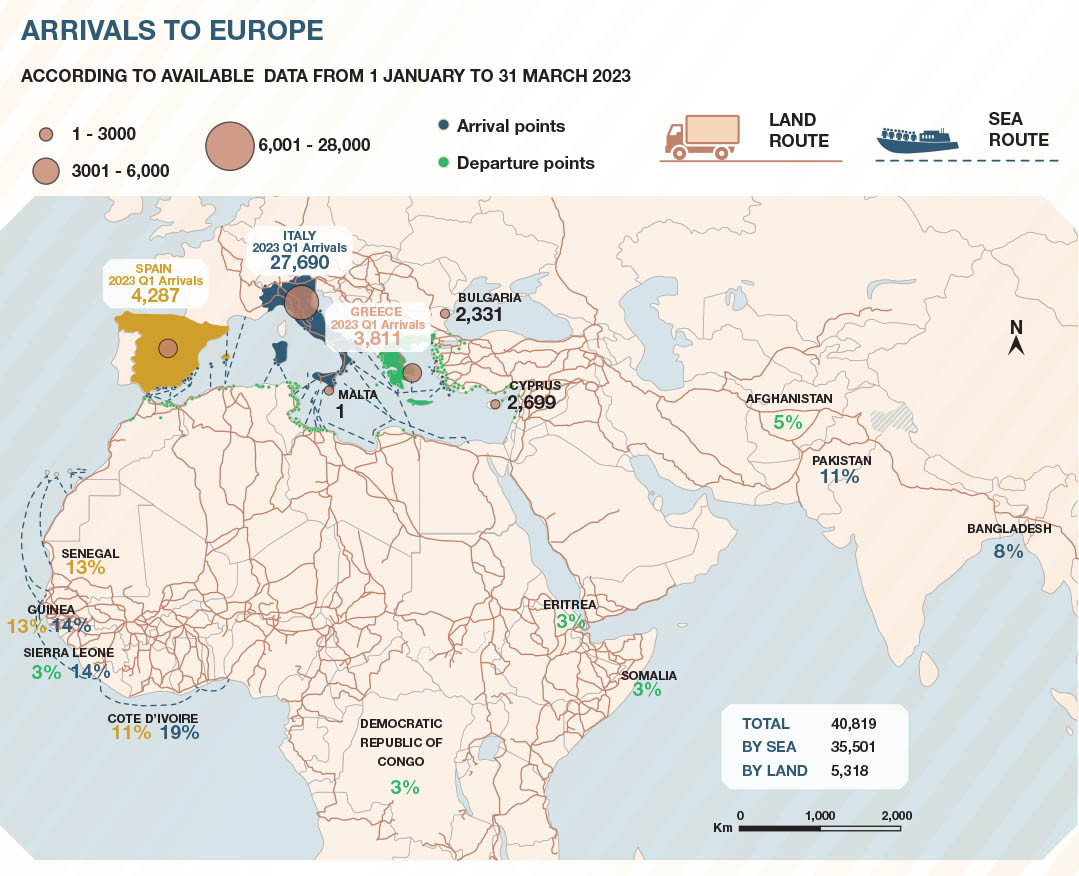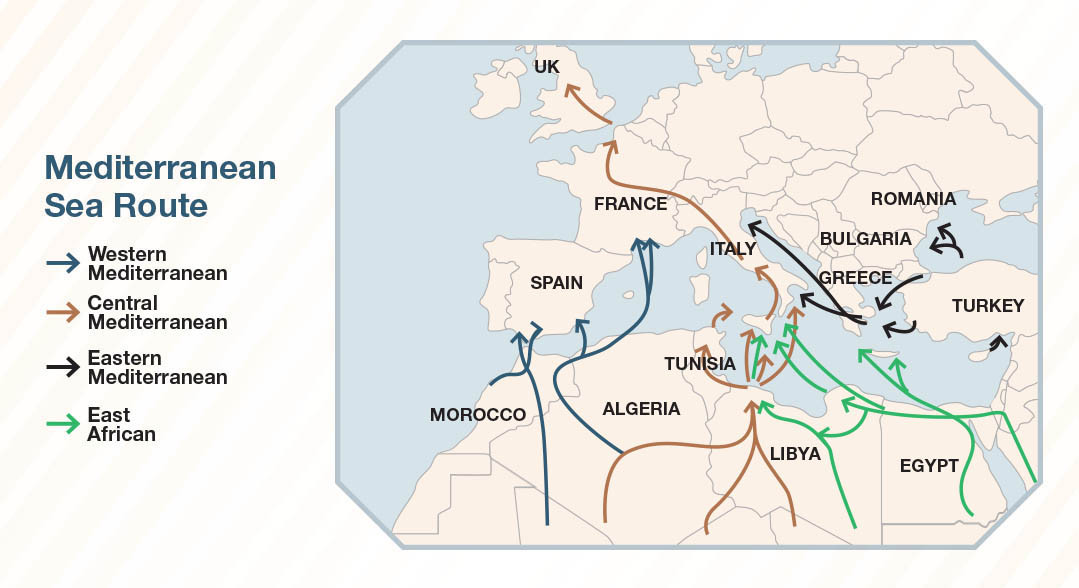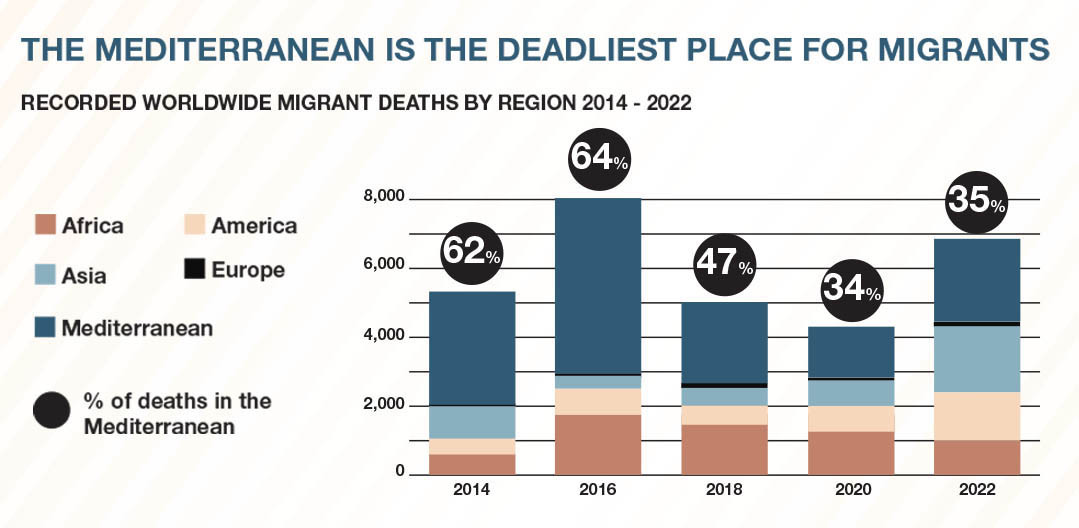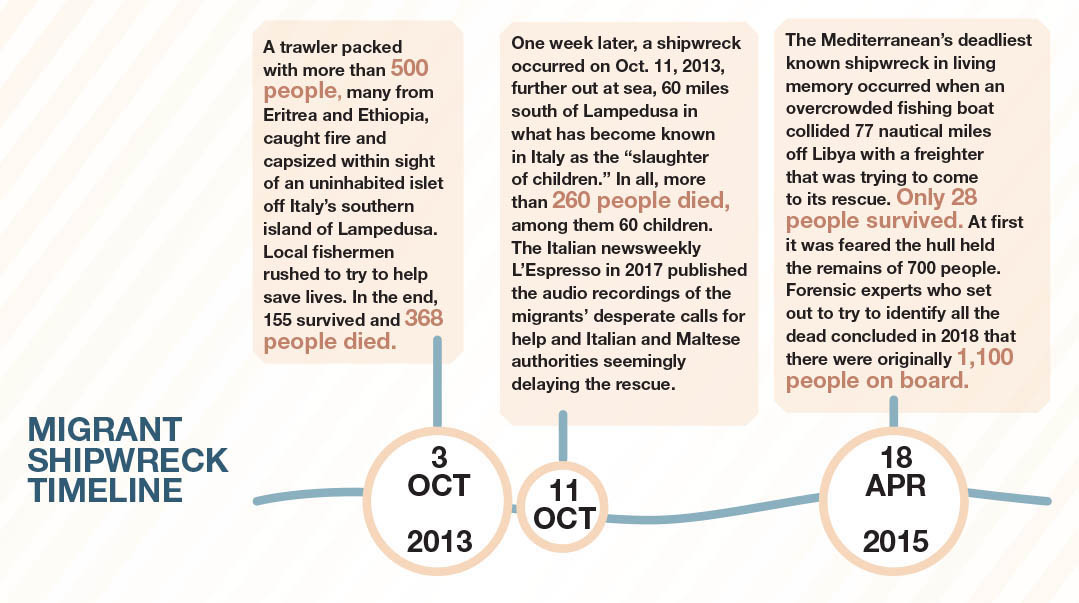Even a week after the shipwreck, bodies were being fished out of the Mediterranean Sea. The overcrowded boat which capsized and sank south of Greece, on June 14, was smuggling over 700 migrants. Among the men, women and children onboard the vessel bound for Italy, a vast majority — 400 to 500 — hailed from Pakistan, others came from Afghanistan, Syria and Egypt. But of the survivors so far, only a small number are Pakistani.
The boat is believed to have set off from Tobruk, a region in eastern Libya which is one of the main departure points for smugglers’ boats trying to make their way to Europe. According to the United Nations’ International Organization of Migration (IOM), the journey from Libya or Tunisia through the Central Mediterranean and north to Europe is the deadliest migratory route in the world. Since 2014, more than 21,000 deaths and disappearances have been recorded in the region. But asylum seekers continue to risk their lives in order to flee misery and conflict in their homelands and the international human traffickers’ racket continues to feed off their desperation.
A probe into the tragic accident is underway in Pakistan, at the order of Prime Minister Shehbaz Sharif, to identify legal loopholes and enforcement mechanism in the country that expose precious human lives to the vagaries of human smuggling. The Greek authorities reported 82 bodies have been brought ashore so far, of which 27 have been identified as Pakistanis. According to the Federal Investigation Agency, at least 209 of those onboard the doomed fishing trawler were Pakistanis, new data suggests. The 104 survivors being tended to in Greece exhibit severe shock and exhaustion, some are being treated for pneumonia; they sleep for long hours perhaps hoping to forget the nightmare they have miraculously survived. Only 12 of those rescued alive are Pakistanis. About 500 people are still missing somewhere in the Mediterranean, far from their homeland. The hope of finding them alive is dim.
So far no women or children have been extracted from the water. Reportedly, the Pakistani passengers were made to travel below deck, in locked holds, mainly the women and children were kept down there for ‘protection’. Perhaps this was the choice of the Pakistani males but it was just as likely not a matter of choice. The EU immigration policy is widely criticized for being hypocritical and discriminatory. Millions of displaced Ukranians escaping the war have been welcomed whereas on the other hand, the approach towards African and Middle Eastern migrants has been described as one of deadly repression.
The FIA claimed to have arrested at least two key suspects from Gujrat and Mandi Bahauddin related to the Greece shipwreck while nine Egyptians have been detained by the Greek law enforcement in Kalamata on suspicion of being the smugglers of the boat, including the captain.
The success of the investigation in Pakistan to curb human trafficking has as much prospect as the European immigration policy being less discriminatory and elitist. Carnegie Europe quotes Shada Islam, a Belgian analyst of EU and Asia affairs on the EU’s failure to forge an effective migration policy. It comes at the expense of human lives, she says. “The EU’s restrictive approach to migration is discriminatory, seeped in pride and prejudice, and an insult to the bloc’s constant lyrical references to safeguarding values and human rights,” writes Islam. “It is inspired by xenophobic narratives peddled for years by the far right and now embraced and amplified by almost all mainstream European political parties.”
“Today, as the EU seeks to build stronger international alliances with African, Asian, and Middle Eastern states, Fortress Europe, with its crude differentiation between ‘good’ Ukrainian refugees who are welcome in Europe and ‘bad’ racialized ones who are not, has also become a major obstacle in the EU’s ambitions of becoming a more consequential geopolitical power,” she explains.
Express Tribune reached out to Josa Balint, program director of a European non-governmental organisation United for Intercultural Action, a European network against nationalism, racism, fascism that work in support of migrants and refugees, for his view on whether migrants are treated fairly at the EU borders. “No, they are not,” he replied over email. “I am sure there are massive scale violations and violence from border police, illegal push-backs, mistreatment and abuse. Several reports about that occurred from all borders, Greece or Hungary or Spain or Italy. So far, since 2015, the EU was not able to decide what shall be the generic policy and no matter what attitude various countries have, the instability allowed unlawful and inhuman tendencies to thrive.”
“There are some groups,” Josa says, “where the support is stronger [where there is any] like Syrian and Ukrainian, as the issues there are more obvious and known by the public. People relate to people [with] whom they have an [shared] attitude and information. Pakistan is very far, and there are many seasonal workers, technically making ‘you’ as labourers and not ‘typical’ refugees.”
 Design by: Ibrahim Yahya
Design by: Ibrahim Yahya
What went wrong?
Smugglers get their ‘goods’ delivered by hook or by crook to get their cut. Trafficking humans is just business, and their safety is by no means a priority for handlers. The use unseaworthy vessels and pack as many migrants as possible inside — sometimes inside locked holds — for journeys that can take days. They head for Italy, which is directly across the Mediterranean from Libya and Tunisia, and much closer than Greece to the Western European countries that most migrants hope to eventually reach.
The ill-fated fishing trawler that sank last week, drowning hundreds of Pakistanis and others seeking asylum, was reportedly repurposed by an Egyptian smuggler network. After departing Libya, on June 9, it had engine trouble, failing and stalling before it went dead completely. There have been reports in the international press that interviewed surviving passengers had to resort to drinking seawater and their own urine when they ran out of fresh water to drink. Stranded in the middle of the open sea, under a scorching sun and the vagaries of weather, some survivors reported having fainted due to heat and dehydration. Finally, after three days of being adrift, the stalled ship capsized 47 nautical miles south of Pylos.
The Greek coastguard has denied having received any calls of help from the migrant boat. Last Saturday, parts of the Greek rescue vessel captain’s testimony were published by Greek media. In it he said the migrants refused help, saying they were going to Italy, and untied a rope loosely tied to the trawler’s bow when the coastguard ship had gone closer to inspect the stranded vessel.
The BBC analysed the movement of other ships in the area. The fishing trawler itself did not have a tracker so it is not detected on the map. The investigation suggests “the overcrowded fishing vessel was not moving for at least seven hours before it capsized. The coastguard still claims that during these hours the boat was on a course to Italy and not in need of rescue.”
The coastguard and military vessels which do not have to share their location also are not shown on the map. However, the BBC data shows hours of activity focused on a small, specific area where the migrant boat later sank, casting doubt on the official claim it had no problems with its navigation.
The BBC report says, “We have used video and photographs authenticated by BBC Verify, as well as court records and shipping logs, to analyse the movement of vessels in the area in the following hours.
The Marine Traffic animation shows a ship called the Lucky Sailor abruptly turning north at 15:00 GMT.
The owner of the Lucky Sailor gave the BBC their timeline of events and confirmed it had been asked by the Coastguard to approach the migrant boat and give food and water.”
According to them, half an hour later a coastguard helicopter located the migrant boat. Two and a half hours after that a vessel named Faithful Warrior also approached the boat and delivered supplies to the stuck passengers via a rope, as a video taken from the Faithful Warrior shows.
“My personal opinion is that they did not care, and let the boat capsize on purpose,” Josa shares. “They heard the SOS calls and still say they were not aware how dire the situation is. Even in Greece, there were protests about the ignorance of the Frontex [the EU border police] and Greek police.”
The Hellenic coastguard later mentioned a sudden shift in weight which caused the boat to overturn. But what caused this sudden shift in weight? The Greek authorities have so far been tight-lipped about the details and have only been irked by the accusations hurled at them for being passive and ineffective. A Greek government spokesperson later said the coastguard had attempted to board the boat to assess the danger but that the passengers had removed a rope that had been attached and did not want help as they just wanted to reach Italy. Is that how the boat went down? What happened during the attempt to provide help? Did the rescue ship try to tow the boat packed with migrants? These details are yet to emerge.
According to AP, passengers reported that the captain had abandoned the ship before it capsized.
 Design by: Ibrahim Yahya
Design by: Ibrahim Yahya
The role of humanitarian workers and state responsibility
Alarm Phone is a network of activists who run a hotline for migrant boats in distress. It puts the onus of the hundreds of lives lost in the shipwreck wholly on Greece’s migration policy. Athens is “Europe’s shield” to deter migration, it said. The Greek coastguard rebutted saying it had accompanied the vessel even after it refused assistance and then launched a vast search and rescue operation after the boat capsized.
The EU has long been divided over the issue of migration as the Mediterranean countries complain that they bear the brunt of receiving and processing migrants. “Some countries see refugees as cheap workforce, some [see] an invading army. [It is] hard to make a compromise on this...” Josa says.
In 2015, Ayat Abuznade was in Greece helping refugees and continued helping for several years after which she founded an NGO named Team Humanity USA in the year 2019. She began her humanitarian work in Jordan helping at the biggest Syrian war refugee camp. “In 2015, I decided to head to Greece which, at that specific time, was the heart of the European migrant crisis,” she tells Express Tribune, “and there was an influx of people from Afghanistan, the Middle East... Anybody who was at that time facing political conflict and instability in their country, they were all migrating and fleeing from Turkey to Greece.”
She saw first-hand the condition of the migrants coming ashore. “We were physically on the ground, helping people that were coming in through boats. These are all innocent people who are fleeing horrific situations.”
However, over the years, finding help and shelter easily is even less within the reach of those migrating to foreign lands. The presence of NGOs at the EU borders has been limited due to several EU policies. “There have been a lot of NGO workers who were criminalized,” Ayat explains. Humanitarian workers can no longer be there working on ground. They can only phone in the authorities to alert them of a boat if they have information. But this system is not the most responsive. “I've heard stories that people have been saying nobody goes out to help [anymore] when NGO workers and other people call in when they see a boat is at sea and coming through ... which is incredibly unfortunate and sad.”
Dr Carmine Conte is the Legal Policy Analyst at the Migration Policy Group (MPG), an independent Brussels-based think-and-do tank that conducts evidence-based projects, research and campaigns in the areas of integration, migration and anti-discrimination. “Many NGOs, like Sea-Watch or Médecins Sans Frontières, are filling these gaps in search and rescue activities because EU member states have not been active at several times,” he explains speaking to Express Tribune. “It's crazy but NGOs are facing trials because of the accusation of being smugglers or facilitating smugglers.”
Dr Conte’s organization advocates the implementation of a European search and rescue (SAR) operation that assigns clearly defined responsibilities to certain authorities, national stakeholders and to other European actors, including NGOs.
“When it comes to providing SAR in the Mediterranean, everything is now left to [EU] member states. We are seeing that this is not enough to save lives in the Mediterranean and that there are many accidents like the one near Greece.
This is one major gap we are detecting and also that there is no agreement among EU states on SAR.”
 Design by: Ibrahim Yahya
Design by: Ibrahim Yahya
Changing narratives on smuggling
Although some European countries are shirking the responsibility of welcoming refugees, it is not only official apathy that drives migrants to death at sea. Ayat believes, “The first person to blame or the people to blame are definitely the smugglers who are the ones putting these people on the boats because they don't care for them. They wouldn't go on the boats with them. They just pocket the money and then they let them go, not knowing what the route is going to look like, not knowing what country is going to accept them, where they're going to land.”
Dr Conte argues that we have to see the bigger picture and consider the root causes. “We have to change the narrative on smuggling a bit. It is part of the problem, not the only problem,” he says. “Migrants have to resort to smugglers because they have no other way to come to Europe. It's not like these people are happy to pay huge fees to be on overcrowded boats to come to Europe. This shows the desperation they are in.” In his opinion, it is important to provide safer legal access to Europe, at least to claim asylum. Settlement schemes, private sponsorships, complementary pathways and Mediterranean corridors can ensure that asylum seekers reach Europe safely.
 Design by: Ibrahim Yahya
Design by: Ibrahim Yahya
Developing a humane approach to immigration
The topic of migration is very sensitive, very political, and unfortunately it seems that Europe is headed towards more and more restrictive policies for migrants. The experts that Express Tribune spoke to all state that the policy arena is chaotic regarding this issue.
There is a far-right government in Italy and there Spain is also seeing more right-wing parties taking hold. All eyes will be on the French election as there is a risk that an anti-migration narrative will gain more support there as well.
Countries like Poland and Hungary have a clear position that is very restrictive on migration. “This is also reflected in the new position of the new pact. They don't want to really share responsibilities with southern countries or northern European countries on asylum. This creates a very hostile environment everywhere and in the EU,” says Dr Conte.
Spain, Italy, Greece are the real frontiers with Greece under the most burden as it has the weakest economy to support migrants. These states sometimes have no capacity or political will to such welcome refugees or launch search operations for those lost at sea. The major gap in rolling out a clear migration policy comes from the lack of a comprehensive European level agreement.
How can the EU develop a migration policy that can stem the human rights violation of migrants seeking asylum there? “As far as EU policies regarding boats that arrive, I think all of those policies need to be amended,” Ayat says. “Anything that involves any kind of human rights violation against any migrant, or prevents or obstructs any type of humanitarian rescue effort, needs to be completely amended.”
“A lot of it has to do with some kind of workable balance with a lot of the European countries, like ones who have more access to money can take more migrants in. Just figuring out that kind of balance is incredibly important.
Because for Greece in 2015, it was the only country that assumed full responsibility for over one million people that were coming through. Financially, they were not able to take on a big load like that.”
She suggests the first thing is to find a country that is willing to accept all the people coming through the EU borders and a country that has the financial capacity settle the migrants. Migrants should not be placed in refugee camps and tents but be offered relief and workable plans to house them.
Secondly, echoing Dr Conte’s views, Ayat suggests the establishment of some type of legal route for migrants. “These people [should] know that they are going to be accepted and they [should] know that they're going to be entering a new country that it will not be so easy, but also they won't be treated as animals or disregarded as humans. That will definitely take everything away from what's been happening these past several years, all these dead bodies that are occurring with boats being capsized or people saying rescue efforts are not a priority.”
